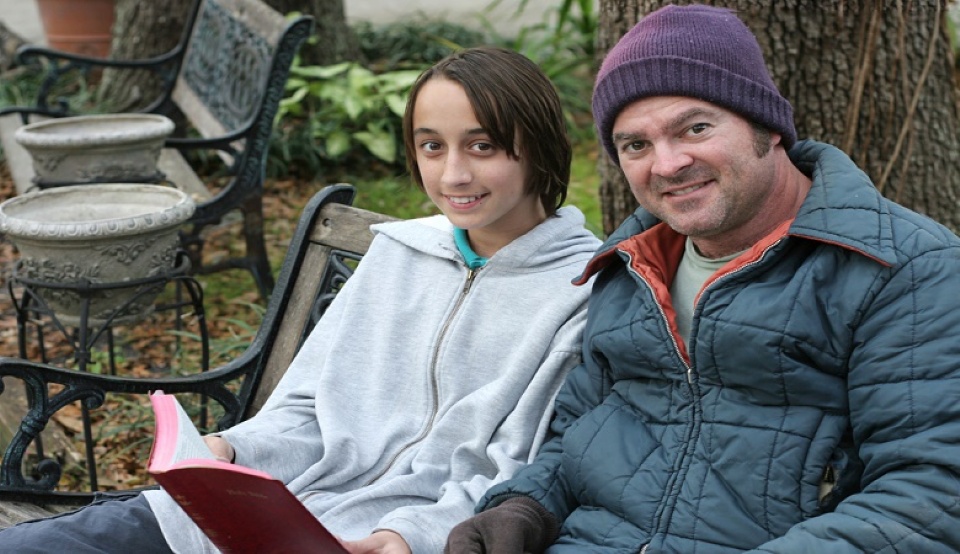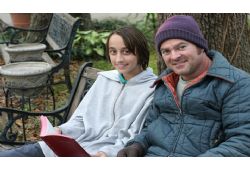Changing the world for the better begins with random acts
of kindness. That is the heart of the
message from the movie, Pay It Forward. The quirky hit, released in
2000, stars Kevin Spacey as a middle school social science teacher with a gift
for inspiration and Haley Joel Osment as the acolyte who surpasses his
teacher's wildest expectations. More than just a melodramatic tear-jerker, Pay
It Forward has developed a cult following amongst educators who
recognize the film's core philosophy as a valuable lesson worthy of the
classroom.
Roberta Laucke, a teacher at Twin Oaks Elementary School
in Laval, was so inspired when she watched the film last summer, she
immediately began laying the groundwork for a Random Acts of Kindness Club
for the students at her school. “I spoke to some other teachers and did some
research online and discovered that the Pay It Forward model is
being integrated into schools all across North America,” explains Lauke.
Laucke, along with fellow teachers Mirella Simone, Jennifer
Goodman and Ellen Dennick, started Random Acts of Kindness last
September and the club has been thriving ever since. Those involved meet once a
month, during lunch, with the objective of cultivating kindness and compassion.
Laucke said that the club's acts of kindness have
included everything from making origami doves for the veterans that visit the
school, to baking cookies for police officers, to making bookmarks and sneaking
them into the collection of books in the school's new library. Recently, the
club made sandwiches for the homeless. “We entrusted the help of a volunteer
who took the sandwiches and delivered them to the homeless living on the
streets of Montreal,” adds Lauke.
Near the end of the film Pay It Forward, Osment's
character, seventh-grader Trevor McKinney, confesses that he believes it's
difficult for people who are so used to things the way they are - even if
they're bad - to change. "Cause they kind of give up. And when they do,
everybody kind of loses." Uncorrupted by adult cynicism, McKinney refuses
to remain locked in a world of pessimism and sacrifices everything to prove
that spontaneous acts of compassion can change the world.
The opinions of the students at Twin Oaks regarding Random Acts of Kindness echo with the
same youthful optimism expressed in the film. Fourth grade student
Sabrina confessed that she joined the club because she loves to do kind things
for others. “You shouldn't just do nice things for people just because
someone tells you to," she says. "You should do nice things without
being asked."
Third
grade student Allyah spoke from her heart when she
described the personal reward she experienced while making sandwiches for the
men and women who live on the streets. “It felt good to give food to people who
are experiencing misfortune.”
Embracing heartfelt choices has opened many of the club
members’ eyes to previously unknown realities. Awareness of the trials and
tribulations of others has made the students more appreciative of what they
have. Fabrizio, a fourth grade student, says that his newfound understanding
about the plight of the homeless has deepened his gratitude, and he insists
that he does not want to take his good fortune for granted. “Some unlucky
people don't have homes. Knowing that makes you appreciate what you have.”
Third grade student Matteo hit the nail on the head when
he articulated what a great gift kindness is. “I don't need people to give me
stuff,” he says. “Instead, I want to give to others. It makes my day being in
this club.”
Dennick provided an anecdote demonstrating how the cultivation
of empathy is affecting the behavior of the students in the club. When the students recently baked Mother’s Day
cookies for a woman's shelter, none of the students complained about the
activity. “Not only that, not one club member asked if they could take a cookie
to snack on,” adds Dennick. “Clearly, the message is getting
through."

 In The Latest Issue:Latest Issue:
In The Latest Issue:Latest Issue:
- Celebrating Community an...
- Celebrating the Unsung H...
- Understanding Newborn St...
Articles
Calendar
Virtual- ANNUAL TEACHER APPRECIATION CONTEST
- APPUI LAVAL
- ARTS & CULTURE
- CAMPS
- CAR GUIDE
- CCIL
- CENTENNIAL ACADEMY
- CHARITY FUNDRAISING
- CITYTV
- COSMODÔME
- COMMUNITY CONNECTIONS
- COVER STORY
- DINA DIMITRATOS
- ÉCOLE SUPÉRIEURE DE BALLET DU QUÉBEC
- EDITORIALS
- ÉDUCALOI
- EDUCATION
- EMPLOYMENT & ENTREPRENEURSHIP
- FÊTE DE LA FAMILLE
- FÊTE DU QUARTIER SAINT-BRUNO
- FAMILIES
- FESTIVAL LAVAL LAUGHS
- FÊTE DE QUARTIER VAL-DES-BRISES
- FINANCES
- GLI CUMBARE
- GROUPE RENO-EXPERT
- HEALTH & WELL-BEING
- 30 MINUTE HIT
- ANXIETY
- CHILDREN`S HEALTH & WELLNESS
- CLOSE AID
- DENTAL WELLNESS
- EXTREME EVOLUTION SPORTS CENTRE
- FONDATION CITÉ DE LA SANTÉ
- GENERAL
- HEARING HEALTH
- MESSAGES FROM THE HEALTH AGENCY OF CANADA
- MENTAL HEALTH
- SEXUALITY
- SOCIAL INTEGRATION
- SPECIAL NEEDS
- TEENS
- THE NUTRITION CORNER
- THE NUTRITION CORNER - RECIPES
- VACATION DESTINATION
- WOMEN'S FITNESS
- WOMEN'S HEALTH
- HILTON MONTREAL/LAVAL
- HOME & GARDEN
- INTERNATIONAL WOMEN'S DAY
- JAGUAR LAVAL
- LAVAL À VÉLO
- LAVAL FAMILIES TV SHOW
- LAVAL FAMILIES MAGAZINE CARES
- LAVAL URBAN IN NATURE
- LE PARCOURS DES HÉROS
- LES PETITS GOURMETS DANS MA COUR
- LEON'S FURNITURE
- LEONARDO DA VINCI CENTRE
- LFM PREMIERES
- LIFE BALANCE
- M.P. PROFILE
- MISS EDGAR'S AND MISS CRAMP'S SCHOOL
- MISSING CHILDREN'S NETWORK
- NETFOLIE
- NORTH STAR ACADEMY LAVAL
- OUTFRONT MEDIA
- PASSION SOCCER
- PARC DE LA RIVIÈRE-DES-MILLE-ÎLES
- PÂTISSERIE ST-MARTIN
- PIZZERIA LÌOLÀ
- PLACE BELL
- PORTRAITS OF YOUR MNA'S
- ROCKET DE LAVAL
- SACRED HEART SCHOOL
- SCOTIA BANK
- SHERATON LAVAL HOTEL
- SOCIÉTÉ ALZHEIMER LAVAL
- STATION 55
- STL
- SUBARU DE LAVAL
- TECHNOLOGY
- TEDXLAVAL
- TODAY`S LAURENTIANS AND LANAUDIÈRE
- TODAY`S LAVAL
- WARNER MUSIC
- THIS ISSUE
- MOST RECENT
Magazine
Cultivating Empathy at Twin Oaks Elementary
Articles ~e 105,7 Rythme FM 4 chemins Annual Teacher Appreciation Contest Appui Laval Arts & Culture Ballet Eddy Toussaint Camps THIS ISSUE MORE...
CONTESTS Enter our contests
CONTESTS Enter our contests
CALENDAR
Events & Activities
COMMUNITY Posts Events
PUBLICATIONS Our Magazine Family Resource Directory
LFM BUSINESS NETWORK Learn more
COUPONS Click to save!
COMMUNITY Posts Events
PUBLICATIONS Our Magazine Family Resource Directory
LFM BUSINESS NETWORK Learn more
COUPONS Click to save!
SUBSCRIPTIONS
Subscribe to the magazine
Un-Subscribe
E-NEWSLETTER Subscribe to our E-newsletter Un-Subscribe
WRITE FOR US Guidelines & Submissions
POLLS Vote today!
E-NEWSLETTER Subscribe to our E-newsletter Un-Subscribe
WRITE FOR US Guidelines & Submissions
POLLS Vote today!
ADVERTISERS
How to & Media guide
Pay your LFM invoice
SUGGESTIONS Reader's Survey Suggest a Listing
LFM About Us Our Mission Giving Back Contact Us
SUGGESTIONS Reader's Survey Suggest a Listing
LFM About Us Our Mission Giving Back Contact Us
 PICK-UP LOCATIONS
Get a copy of LFM!
PICK-UP LOCATIONS
Get a copy of LFM!
TERMS & CONDITIONS Privacy | Terms
ISSN (ONLINE) 2291-1677
ISSN (PRINT) 2291-1677
Website by ZENxDESIGN




 BY:
BY: 


Tweet
Share